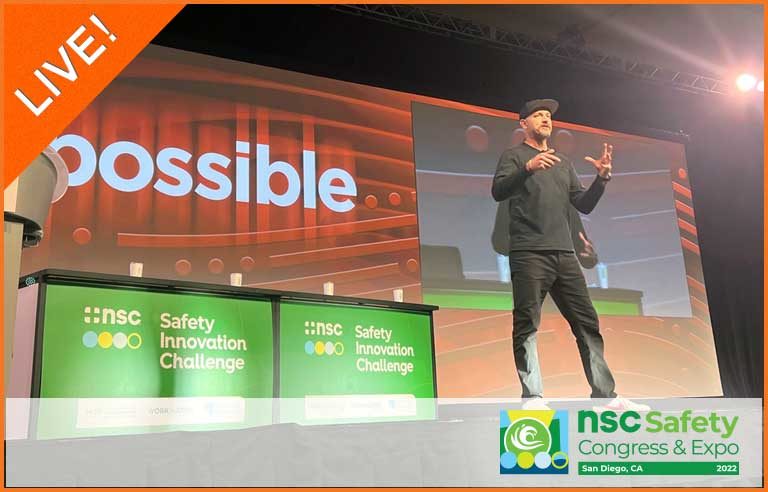“‘Impossible’ is a fallacy,’ speaker says in tech-driven Closing Keynote

Imagine if a colonial American had invented FaceTime. Mick Ebeling has, and the way he sees it, the person behind the craze likely would have been a candidate for burning at the stake.
Thankfully, we now live in a culture far more receptive to innovation. That’s why Ebeling, an entrepreneur and the founder of Not Impossible Labs, on Wednesday challenged attendees of the Closing Keynote at the 2022 NSC Safety Congress & Expo in San Diego to join the movement to use technology for change.
“What it means to be human and to live on this planet is we are constantly, always evolving things from impossible to possible,” Ebeling said. “And my question to you is: If everything that is possible today was impossible first, then doesn’t that also mean what is impossible today is on the same trajectory?
“‘Impossible’ is a fallacy. ‘Impossible’ is a temporary state of being that we live with, but it’s our job while we’re here to do whatever we can to make the ‘impossible’ possible.”
Ebeling prefaced his remarks by asking how many in the crowd attended his address during the Opening Session of the 2019 NSC Safety Congress & Expo, which also took place in San Diego.
“So, did anything happen between then and now?” he asked with a smile, a nod to the COVID-19 pandemic. “A couple things?”
From there, he discussed the genesis of his company, which sprouted from Ebeling’s inspiration after attending an art gallery show to benefit Tony Quan, a Los Angeles street artist with Lou Gehrig’s disease.
Ultimately, Ebeling recruited a group of creators and scientists to live in his home, where they developed the Eyewriter, a device that tracked Quan’s eye movement and allowed him to create art again for the first time in seven years.
To Ebeling, such inventions loom as opportunities to “change the world through technology and story.” By individualizing a problem through storytelling, we can begin the path toward creating widespread solutions.
“If we can tell the story of one and solve for one,” Ebeling said, “that can lead to the helping of many.”
– Kevin Druley, reporting from San Diego
Post a comment to this article
Safety+Health welcomes comments that promote respectful dialogue. Please stay on topic. Comments that contain personal attacks, profanity or abusive language – or those aggressively promoting products or services – will be removed. We reserve the right to determine which comments violate our comment policy. (Anonymous comments are welcome; merely skip the “name” field in the comment box. An email address is required but will not be included with your comment.)

